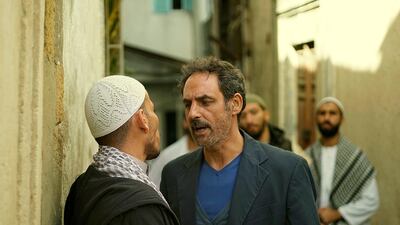Tunisian writer and director Mahmoud Ben Mahmoud's latest film, Fatwa, arrived at Cairo International Film Festival's Horizons of New Arab Cinema Competition following on from the euphoria of winning Best Film and Best Actor for Ahmed Hafiane at The Carthage Film Festival earlier this month.
Hafiane (who starred in Ben Mahmoud's 2012 film The Professor) plays a divorced father, Brahim Nadhour, who has been residing in France, and returns to Tunisia after his son dies in a motorcycle accident. When he arrives, grief-stricken Brahim discovers that in the period before his death his son had quit university to work with a radical Islamist group that had declared a fatwa on his secular ex-wife, Loubna, played by Ghalia Benali.
Brahim embarks on a quest to discover the reasons for his son’s radicalisation and in the process, also discovers that his native land has itself transformed. Ben Mahmoud says, “I wanted Brahim to have had a geographical distance between himself and his homeland, which would give him a cultural idealisation so that when he returns to Tunisia and sees all the changes and the Salafist movement, he would be in real shock.
“The events of the movie take place in 2013 and this for Tunisia is a very black year,” Ben Mahmoud continues. “It was when a number of politicians were assassinated and so many terrorist attacks took place.”
In January 2011, the Tunisian populace took to the streets to protest against corruption leading to the ousting of then President Zine el-Abidine Ben Ali from power and the advent of parliamentary democracy in the north African state. Yet there were many unintended consequences, some terrible, as the country tried to implement voting and a new legislative process. “It’s true that there was success in Tunisia when it came to allowing the freedom of ideology and of ideas, but this also allowed terrorists to be as free as the liberals,” the director says.
Ben Mahmoud acknowledges that this is not a problem that only affects newly formed democracies. "This is what makes the film relatable to so many countries that are suffering with the same dilemma," he says.
"The main motive to create this film is to combat this global focus on extremists. I wanted to show the world a regular, moderate and authentic Muslim, who these days we never see on television. He cares about the real reason as to why his son was killed, whereas the media is only focusing on the extremist. This is becoming a global phenomenon and regular Muslims are not being presented."
Ben Mahmoud believes that the success of the film has been down to the fact that so much of the audience can identify themselves with some aspect of the grief-stricken father. He himself identifies with this feeling of being an outsider in his homeland – though born in Tunis in 1947, he now lives in Belgium. “I never thought the price of freedom would be as heavy as it has been,” he says.
The decision to call the film Fatwa, according to Ben Mahmoud, is aimed at showing how words are malleable things that can change meaning and significance over time. "I come from an Islamic background," he says. "My father was an Imam and my uncle was a mufti, a legal scholar that gives out fatwas. Back then – and this is something westerners don't know – fatwa had a very positive meaning and the goal of a fatwa was to facilitate Muslims when it came to coping with life."
"Then after Khomeini declared a fatwa on Salman Rushdie it changed from something peaceful to something bloody. That's why I chose this name, because it's controversial and there are fatwas in the movie targeting the father, mother and the son."
_______________________
Read more:
Yemen's first-ever Oscars submission to release in UAE cinemas
'About A War' documentary recalls the Lebanese civil war through three ex-fighters
Saudi film ‘Amra and the Second Marriage' tackles a shift in tradition
_______________________
The film was originally conceived to take place in Belgium. The idea came to Mahmoud when he read an article, around 2004, about a jihadist camp in Belgium. He wrote the script, but the financing fell through. Following the events in Tunisia, he read a lot about what was happening in 2012 and 2013 and decided to rework the script to take place there. He kept the same characters, but removed the camp part. He also retained the Belgian producers, the two-time Palme d'Or winning filmmakers, the Dardenne brothers, who are celebrated for dealing with social issues and their use of hand-held cameras to create an almost documentary sensibility to their movies.
Some of these aesthetic touches are visible in Fatwa. "I did take their advice," says Ben Mahmoud. "They had minor comments on the script and some other notes about the edit, but they didn't interfere with the shooting or anything. Perhaps I'm influenced unconsciously by their way of doing movies, because they don't exaggerate and there is a lot of simplicity, but on the other hand, I didn't have a huge budget so the movie had to be shot simply."
Simply shot it may be, but nonetheless, the resulting film is extremely complex.
Fatwa is playing in competition at the Cairo International Film Festival today


